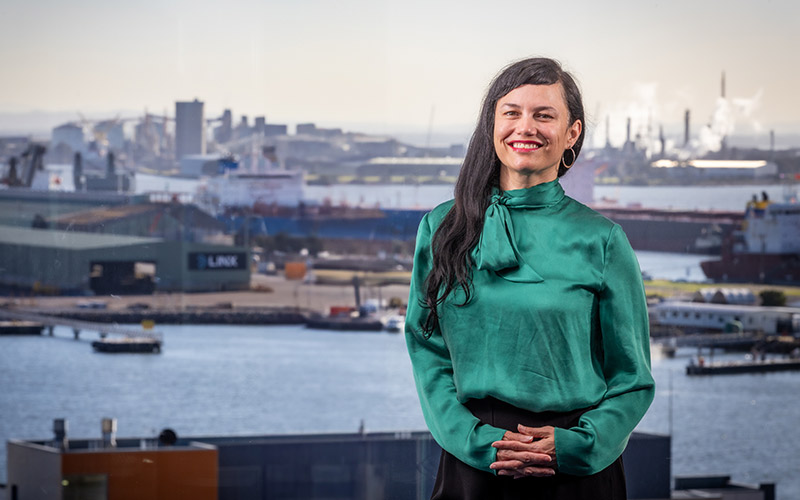Uncovering the Social Barriers to a Greener Future
Dr Vanessa Bowden
When Dr Vanessa Bowden was an undergraduate at the University of Newcastle she found a passion for social justice issues in its sociology department. Following years of study, she now works as a sociologist at the University of Newcastle and is seeking to answer one of the biggest issues of them all ‘how can we do more about climate change?’

Rewind to 2019 and Vanessa recalls staring out of the window into a blood red hazy sky. The devastating summer bushfires swept through the area, and she relied on an app to tell her when it was safe to go outside and breathe the air. The reality was apparent. Without significant change, these events were only going to worsen.
“Knowing that my child and future generations may have long periods of time where they actually can’t even go outside, and, most importantly, that the worst elements of this are preventable, has really driven me to do what I can to understand what the blockages to change are,” says Vanessa.
Driving change
Vanessa’s research seeks to understand climate change as a social, political and economic issue, rather than an environmental or scientific one. She’s looking at the bigger picture and exploring why we aren’t responding in an adequate way to reduce emissions and create a greener economy.
“It’s almost a cliché now, but climate change really is the primary challenge of our time. It goes to not only our use of resources and the (currently inequitable) distribution of them, but the ways we grow our food, organise our transport, and our impact on other species and flora,” she says.
“The most frustrating element of this is that there are so many people working on solutions, and yet there’s a lack of leadership from so many of those in power to implement the change needed.
“I really want to understand what it is that people in these positions are finding to be the barrier, and how we can work to facilitate the changes needed.”
A healthier tomorrow
A healthier climate starts with change. Since commencing her research, Vanessa has been exploring where the possibilities for a proactive response to climate change exist and how the corporate and political sectors, as well as members of the public can work to make this happen.
Vanessa acknowledges that resistance to and fear of change often comes from a lack of understanding as to how we might respond to climate change both locally and as a nation. Her research aims to help people understand where the opportunities are in times of change.
“It’s a big call, but my high level goals are to contribute to a transformation of how we relate to our environment – seeing ourselves as part of it, rather than controlling it, which we clearly don’t, anyway.”
In positive news, Vanessa has seen the role of the corporate sector in climate change politics change dramatically in the time she’s been researching. What was once a loud vocal majority of people in denial has now swung to corporates setting net zero targets and leading the way in taking action.
“Climate change politics has long been an issue of intense polarisation in Australia,” she says. “My research seeks to understand how industries and politicians participate in these debates, and hopefully shows us that there are better ways we can respond.”
Further reaching outcomes
Changing how we respond to climate change impacts not only us, but people the world over.
“Australian responses to climate change don’t happen in a vacuum; they happen within a broader global political and economic framework,” says Vanessa.
“By situating the nation’s responses to climate change within a global context, we can further understand the broader trends from industries as well as possibilities for change.”
Working today
There’s no mistaking Vanessa’s passion and drive, and with the assistance of other professionals in her field she’s nurturing leaders of change.
Dr Bowden is currently working with Professors Daniel Nyberg at the University of Queensland and Christopher Wright at the University of Sydney on an ARC funded research project looking at how key industries in Australia are adapting to climate change.
“By bringing our critical analysis of how industry and governments are responding to climate change, we are nurturing a new generation of business leaders with environmental sustainability at the core of their practice,” she says.
“My work has helped us understand how certain assumptions within our economy and society, such as the need for unlimited growth, will need to be challenged if we are to adequately deal with climate change.”
“I think only by making that more transparent can we truly get at the crux of the problem and begin to deal with it, and I’m excited to be at the forefront of that,” says Vanessa.
The University of Newcastle acknowledges the traditional custodians of the lands within our footprint areas: Awabakal, Darkinjung, Biripai, Worimi, Wonnarua, and Eora Nations. We also pay respect to the wisdom of our Elders past and present.
